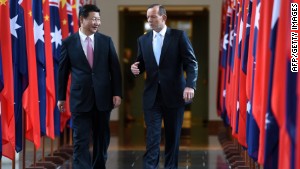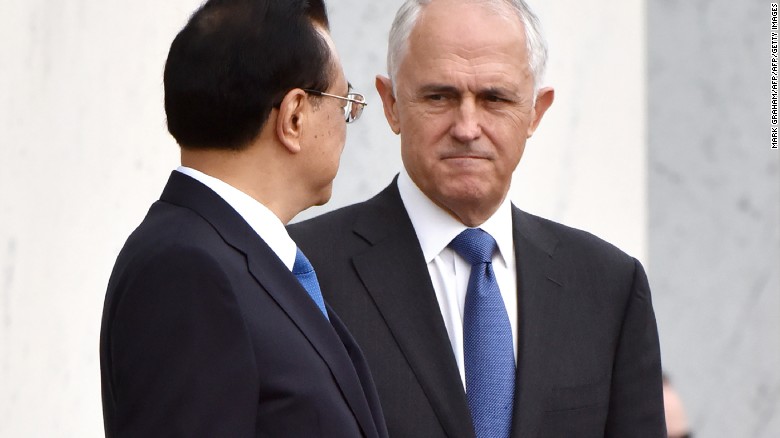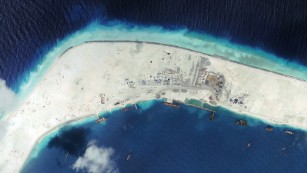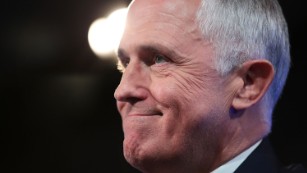China versus the US: Australia's increasingly hard choice
At the start of his five-day visit to Australia, Chinese Premier Li Keqiang told parliamentarians in Canberra that "peace was the most precious thing."
That might be Chinese diplomatic boilerplate, but Li was speaking at Parliament House, where security had been tightened following the appalling atrocity in London, so it would have felt very real to those in the room.
Of course, Premier Li insisted in his Canberra speech that China "will never seek dominance."
South China Sea: What's at stake
Those who have watched Beijing's aggressive island-building program in the South China Sea may doubt that sentiment, and during Li's visit we are reminded again of the inexorable shift away from American hegemony back to a more contested global order.
Even if we take Li at his word, this still leaves open the possibility that China wants to achieve a situation in which no other state is dominant, especially in China's Pacific backyard.
It isn't unusual for a global heavyweight to want to push a rival out of its own region. In fact, it would be strange for a country as powerful as China to demand anything less.
RELATED: Chinese moves in South China Sea unsettling to Southeast Asian nations
But amid rising tensions in the South China Sea, this puts Australia in a difficult situation.
"We don't want to see taking sides, as happened during the Cold War," Li told his audience at a lunch hosted by Australian Prime Minister, Malcom Turnbull.
Lucky country
Australia has always been in the lucky position where its major economic partners -- first the UK, then the US, and since the 1970s, Japan -- have also been major strategic partners.
US-Australia refugee deal: What you need to know
Now, China is its major trading partner, and it has strategic objectives that are directly at odds with those of Australia's ally, the United States.
And, although its double-digit growth years may be behind it, China can still outgrow all the mature industrialized economies, which means it will continue to catch up to the US. China is on the path to becoming the world's largest economy and it shows every sign of wanting military capabilities and status on the world stage to match.
Australia's response has been to insist that China respect what Prime Minister Malcolm Turnbull, in his speech welcoming Premier Li, called the "rules-based international order."
Could Trump fracture US and Australia's 'great alliance'?
Notably, Turnbull did not refer to the liberal international order, as his foreign minister, Julie Bishop, had pointedly done in Singapore a week earlier, adding a sharper ideological edge to the concerns about China's world role.
Yet, the message is the same either way: Australia wants China to respect a "rules-based order" that Beijing had no hand in creating, and which is premised on sustained American dominance in the Asia Pacific region.
China has benefited from that order in the past, but it is strong enough now to insist that it have a say.
If a place in the old order is all Australia is offering, China can politely turn that offer down.
Two-way trade
However that won't stop the two nations from trading peacefully and profitably with each other.
Prime Minister Turnbull reminded Premier Li in his welcoming remarks that Australia and China have a $150 billion two-way trade relationship -- something that gives Canberra some leverage.

Australia, China sign huge trade deal
Indeed, reports from the Li visit suggest Australia feels confident enough in its position to turn down China's proposal to formally tie Australia's infrastructure development plans for the north of the country to China's regional Belt and Road initiative -- Xi's landmark scheme to pump billions of dollars into infrastructure and other projects across Asia, Africa and Europe.
A decision to sign onto the so-called Belt and Road project would have been symbolic -- it is seen by many Western analysts as a tool to spread China's regional influence at American expense.
Then again, the China-led Asian Infrastructure Investment Bank is often seen in the same light, and Australia initially resisted joining AIIB -- apparently at America's request -- but then changed its mind in early 2015.
RELATED: Score one for China! US loses Asia bank tussle
Australians know well that the China connection has helped keep 'the lucky country' out of recession for 25 straight years.
And the deeper that relationship goes, the harder it will become for Australia to choose America over China.
If Beijing is smart, it will never force Australia into a position where it must make a choice -- potentially creating a major breach with either Beijing or Washington. Over time, economics will exert its own force.
Perhaps that's why Premier Li insisted that China won't seek dominance -- in time, dominance will come to China.
News Courtesy: www.cnn.com














